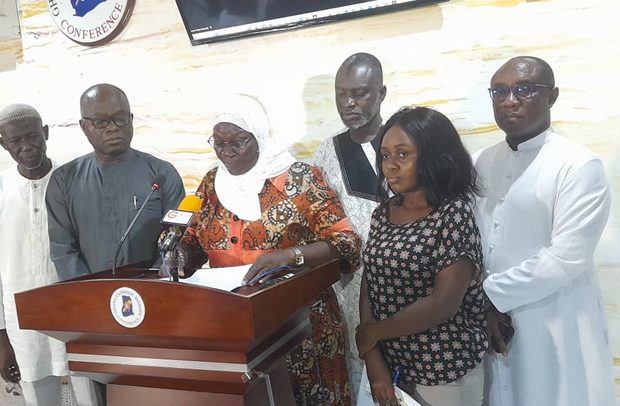Hajia Ayishatu Abdul-Kadiri (M) flanked by some of the leaders
Faith-Based Institutions (FBI’s) have called on the government and stakeholders to use Ghana’s Domestic Debt Exchange Programme (DDEP), as well as the International Monetary Fund (IMF) programme to address immediate economic challenges facing the country.
A statement read by the Chairperson of the Faith in Ghana Alliance, Hajia Ayishatu Abdul-Kadiri at a workshop held in Accra said although it recognizes the difficult decision government made to seek assistance from the (IMF), the move it believes would help build a more inclusive, responsive and sustainable future for Ghanaians.
She mentioned that the workshop was also expected to forster collaboration and networking among Faith Based Institutions and media organizations to share best practices, experiences, and lessons to help develop strategies for addressing economic recovery and debt relief.
The group, however, urged the government not to put undue demands on vulnerable members of society while working to stabilize the economy.
“Inclusive economic recovery demands that the burden of adjustment is not disproportionately placed on the most vulnerable members of our society. We implore the government and all relevant authorities to ensure that socioeconomic policies and programmes are designed with fairness and equity,” the said.
“Our moral duty is to protect the most marginalized and provide them with opportunities to thrive, as their welfare reflects our collective commitments to social justice,” they added.
The workshop was organized by Caritas Ghana, a charity organisation of the Ghana Catholic Bishops’ Conference in partnership with Caritas Africa.
They also called on the government as well as stakeholders to invest in sectors that will help generate employment opportunities, promote innovation while supporting micro, small and medium-sized enterprises to foster an environment conducive to sustainable and inclusive growth.
According to the faith groups, such measures could help build a resilient and diversified economy that would benefits all Ghanaians regardless of their religious beliefs ethnicity or socio-economic backgrounds while pledging to support and partner government and all stakeholders in that endeavour.
The group further asked the government to seek dialogue and collaborate with civil society organizations, religious institutions with diverse voices and invaluable insights to contribute to shaping policies and strategies.
“It is vital that clear communication is provided to the citizens, including updates on the progress made and the impact on the various sectors of our society. Responsible and ethical use of these resources will foster trust and confidence in the government’s commitments to inclusive economic recovery,” they added.
The workshop themed, “The Role of faith-based Institutions (FBIs) and the Media in Securing an Inclusive Economic Recovery and Debt Relief” under the Africa Inclusive Economic Recovery campaign also brought together some notable individuals such as the Secretary General of the National Catholic Secretariat, Fr. Clement Kwasi Adjei, Executive Director, Caritas Ghana, Thomas Awiapo, and Shaibu Adamu from the office of the National Chief Imam.
By Ebenezer K. Amponsah

